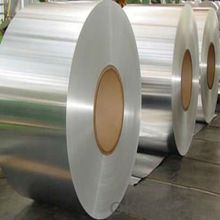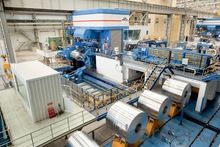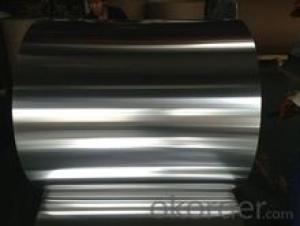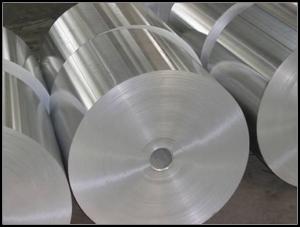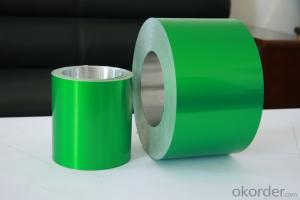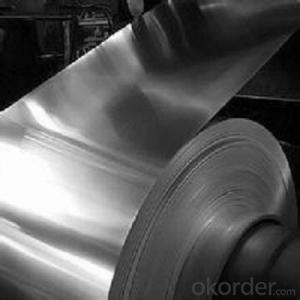50 Mil Aluminum Coil Coated - 1050,1060,1070,1100 Aluminum Coil/Strips DC & CC CNBM
- Loading Port:
- Qingdao
- Payment Terms:
- TT OR LC
- Min Order Qty:
- 100 set
- Supply Capability:
- 300000 set/month
OKorder Service Pledge
OKorder Financial Service
You Might Also Like
Quick Details
| Brand Name: | cnbm aluminum coil | Model Number: | 1xxx alloy | Thickness: | 0.1mm~10mm |
| Width: | 950mm~2200m | Alloy Or Not: | Is Alloy | Grade: | 1000 Series |
| Temper: | O - H112 | 1xxx 1050.1060.1070.1100 alloy: | aluminum coil |
Packaging & Delivery
| Packaging Detail: | Standard Export Packaging/Eye to Ske or Eye to Wall |
| Delivery Detail: | 15~25 Days after received order |
Products are widespread applied in mechanical, electric, transportation, construct, printing, packaging and other field. Applied specifically for beverage can, container, theft-proofing cap, cigarette package, commodity package, medicine package, etc;various uses of capacitors in power electronics industry; the flat sheet,corrugated plate,embossed plate in field of building’s structure, the PS plate in field of printing’s ; the household electrical appliances,daily aluminum products in Light industries, etc; as well as in field of mechanical, transportation, aviation and aerospace, aluminum foil is also used as a functional and structural material.
Specifications
Aluminum Coils - DC & CC
1) Alloy: 1xxx,1050,1060,1070,1100.1235
2) Temper: 0. H12. H14. H16. H18. H22. H24. H26. H32.H34
3) Thickness: 0.1~10mm
4) Width: 25~2100mm
5) Inside Diameter Min: 150mm
7) Outside Diameter Max: 2400mm
8) Dimensions can be produced according to clients' specifications
9) Good plasticity, conductivity
10) Generally used in industrial and construction applications
11) Packing: Standard Export Packing
12) Payment: T/T, L/C at sight
Alloy | Thickness(mm) | Width(mm) | Temper | DC & CC |
1050,1060,1070,1100,1235 | 0.1-10.0 | 25-2200 | O,H12,H14,H16,H18,H22,H24,H26,H32,H34 | DC, CC |
2.5-10.0 | 950-2300 | F, H111,H112 | DC | |
3003,3004,3102,3104 | 0.1-10.0 | 25-2200 | O,H12,H14,H16,H18,H22,H24,H26,H32,H34 | DC, CC |
2.5-10.0 | 950-2300 | F, H111,H112 | DC | |
5052,5083,5754,5005,5182 | 0.1-10.0 | 25-2200 | O,H12,H14,H16,H18,H22,H24,H26,H32,H34 | DC |
2.5-10.0 | 950-2200 | F,H111,H112 | DC | |
8011,8079 | 0.1-10.0 | 25-2300 | O,H12,H14,H16,H18,H22,H24,H26,H32,H34 | DC,CC |
Application | Mainly in printing(PS plate base), Aluminum-plastic composite panel base, construction, decoration, capacitor, cover material, deep drawing products, refrigeration, air conditioner, automobile etc. | |||

- Q: Is it possible to construct furniture or tables using aluminum coils?
- <p>Yes, aluminum coils can be used to make furniture or tables. Aluminum is a versatile material known for its strength, durability, and lightweight properties. It can be easily bent and shaped into various forms, making it suitable for furniture construction. Aluminum coils can be used to create the frame or support structure of tables and other furniture items. They are also resistant to corrosion and require minimal maintenance, making them a popular choice for outdoor furniture and modern interior designs.</p>
- Q: Why does the hollow aluminium rolling shutter door fall off for a long time?
- The series of HO profiles is heated by Doyle's Aluminum Alloy bar by extrusion forming production, use the 6063 Aluminum Alloy material, has excellent plasticity, corrosion resistance, toughness, easy polishing, film. Aluminum Alloy thermal cooling fast, excellent seismic performance, the design of hollow base not only greatly reduce the heat conduction, but also effectively reduces the acoustic resonance effect, suitable for hot summer and warm winter area and some noise pollution area.
- Q: This question asks about the duration an aluminum coil can last before it needs to be replaced or becomes unusable.
- <p>The lifespan of an aluminum coil can vary significantly depending on its application, quality of the material, and environmental conditions. Generally, if properly stored and used, aluminum coils can last for several years without significant degradation. However, in industrial settings where coils are subjected to continuous use and harsh conditions, their lifespan might be reduced to a few years or even less. Regular maintenance and inspection can help extend the lifespan of aluminum coils.</p>
- Q: Can aluminum coils be recycled multiple times without losing their properties?
- Yes, aluminum coils can be recycled multiple times without losing their properties. Aluminum is a highly recyclable material and can be melted down and reused indefinitely without any significant degradation in its properties. This makes aluminum coils a sustainable and environmentally friendly choice for various applications.
- Q: Is it possible to use aluminum coil as a material for crafting jewelry?
- <p>Yes, you can use aluminum coil to make jewelry. Aluminum is lightweight, affordable, and easy to work with, making it a popular choice for crafting. It's also hypoallergenic, which is a plus for those with metal sensitivities. However, it's softer than metals like sterling silver or gold, so it may require more care to prevent denting or bending. Aluminum can be shaped, cut, and polished to create various jewelry designs, but it may not hold up as well over time or under heavy use compared to harder metals.</p>
- Q: How are aluminum coils coated for corrosion resistance?
- Coil coating is the process used to apply a protective coating to aluminum coils in order to prevent corrosion caused by exposure to the environment. The first step in this process involves cleaning and pre-treating the aluminum coil to remove any contaminants, such as grease, dirt, or oxidation. Chemical cleaning agents are typically used, followed by rinsing to ensure no residue remains. Once the coil is clean, a primer is applied to act as a bonding agent between the aluminum surface and the subsequent coating layers. This primer enhances adhesion and provides an extra layer of protection against corrosion. After the primer, a topcoat is applied. This topcoat is usually a polymer-based paint that not only provides the desired color and appearance but also acts as a barrier against moisture, UV radiation, and other environmental factors that can cause corrosion. There are various techniques that can be used for the coating process, including roll coating, spray coating, or coil painting. The choice of technique depends on factors such as cost, production speed, and the desired coating properties. In some cases, an additional clear protective coating may be applied to further enhance the durability and longevity of the coated surface, providing an extra level of protection against corrosion. Overall, the coating of aluminum coils for corrosion resistance is a crucial step in ensuring the longevity and performance of products made from these coils. The specific coating process and materials used may vary depending on the application and desired performance requirements.
- Q: Can aluminum coils be used in the manufacturing of cans and containers?
- Yes, aluminum coils are commonly used in the manufacturing of cans and containers. Aluminum is lightweight, durable, and resistant to corrosion, making it an ideal material for packaging food and beverages. The coils are typically processed and shaped into desired can or container forms before being used in the manufacturing process.
- Q: What does it mean to slice aluminum coil by decoiler machine?
- The operating procedures of decoiler machine: 1, Select appropriate aluminum coil according to production work order requirement to be processed, paying attention to the thickness, width and material of aluminum coil. 2, Put the aluminum coil into the coil loading car with traveling crane and inch the car into the uncoiler. The aluminum coil and decoiler machine should be in the same direction. Hold the aluminum coil down with leading head, and open the auxiliary bearing. 3, Turn on the shovel head, and inch the uncoiler to lead the aluminum sheet into the leveler. Adjust the leveler according to the thickness and width of aluminum sheet to ensure the flatness. 4, Turn on the front gap bridge and back gap bridge in control main platform, inch the leveler to lead aluminum sheet into re-leveler. Adjust the re-leveler to ensure the flatness of aluminum sheet. Put it into the shear gauge and plate shearer. 5, Take back the front and back gap bridge. Inch the plate shearer to cut off the sheet head and shear the aluminum sheet according to production work order. Check the first sheet to see whether it meets the quality standard and whether there is defect in flatness, length, diagonal, and surface of aluminum sheet. If it is qualified, turn on the conveyor. Put the aluminum sheet holder on the pallet. Adjust the pallet according to the width and length of aluminum sheet. Input quantity and length on the control main platform. Then turn on the auto control to produce automatically. The production process can be observed at any time. 6, If there is aluminum coil left, unwind, package and put it into storage in reverse steps.
- Q: Can a spring balance be used to accurately determine the weight of an aluminum coil?
- <p>Yes, you can use a spring balance to measure the weight of an aluminum coil, but the accuracy depends on the balance's specifications. Ensure the balance has a sufficient capacity to measure the coil's weight and is calibrated correctly. Keep in mind that spring balances are less precise than electronic scales, especially for heavy or sensitive measurements. For high accuracy, consider using an electronic scale designed for industrial use.</p>
- Q: What are the different protective film options for aluminum coils?
- There are several protective film options available for aluminum coils, each offering specific benefits and suitability for different applications. Some common options include: 1. PVC (Polyvinyl Chloride) Film: PVC films are widely used for protecting aluminum coils due to their excellent resistance to moisture, chemicals, and abrasion. They provide a high level of surface protection and are available in various thicknesses and adhesive strengths. 2. PE (Polyethylene) Film: PE films are another popular choice for protecting aluminum coils. They offer good resistance to moisture and UV radiation and are generally more cost-effective than PVC films. PE films are available in different grades, including low-density polyethylene (LDPE) and linear low-density polyethylene (LLDPE). 3. PP (Polypropylene) Film: PP films are known for their excellent tear resistance and high tensile strength. They provide good protection against mechanical damage and are suitable for applications where coils may undergo rough handling or transportation. 4. PET (Polyethylene Terephthalate) Film: PET films offer outstanding clarity and transparency, making them ideal for applications where visual inspection of the coils is required. They also provide good resistance to heat, chemicals, and abrasion. 5. Adhesive Coatings: In addition to films, adhesive coatings are sometimes used to protect aluminum coils. These coatings are typically applied directly to the surface of the coil and form a protective layer against moisture, corrosion, and scratching. When selecting a protective film for aluminum coils, it is essential to consider factors such as the intended application, environmental conditions, handling processes, and desired level of protection. Consulting with a supplier or manufacturer can help determine the most suitable option for specific requirements.
Send your message to us
50 Mil Aluminum Coil Coated - 1050,1060,1070,1100 Aluminum Coil/Strips DC & CC CNBM
- Loading Port:
- Qingdao
- Payment Terms:
- TT OR LC
- Min Order Qty:
- 100 set
- Supply Capability:
- 300000 set/month
OKorder Service Pledge
OKorder Financial Service
Similar products
Hot products
Hot Searches
Related keywords


